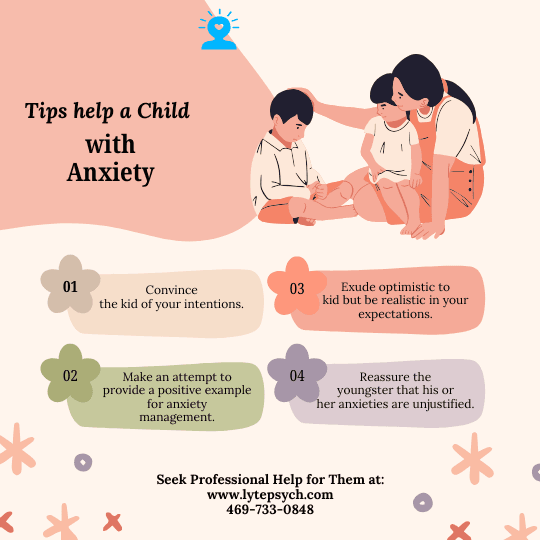Tue May 06 2025
30 Minutes of Child Anxiety Can Feel Like an Eternity, Here is 5 Top Tips on How you Can Help Them at Lyte Psychiatry (Best Adults and Adolescents Therapist and Psychiatrist Near You, Affordable Therapist and Psychiatrist Near You) Dallas & Arlington, TX.

30 Minutes of Child Anxiety Can Feel Like an Eternity — 5 Top Tips to Help Your Child Cope, from Lyte Psychiatry in Dallas & Arlington, TX
If you’ve ever watched your child struggle through a panic attack, cling to your side at drop-off, or spiral into tears over something small — 30 minutes of anxiety can feel like a lifetime. For them and for you.
At Lyte Psychiatry, we work closely with families across Dallas and Arlington, TX, helping children and adolescents navigate anxiety with compassion and clarity. Whether your child is dealing with school stress, social fears, or big emotions they can't explain, you're not powerless — you can help them feel safe, grounded, and in control.
🧠 What Does Child Anxiety Look Like?
🔷 Complaints of stomachaches or headaches
🔷 Perfectionism or fear of making mistakes
🔷 Difficulty sleeping or separating from parents
🔷 Irritability, restlessness, or overthinking
✅ 5 Tips to Help a Child Struggling with Anxiety
Here’s how you can offer calm in the chaos — no training required:
💬 1. Validate First, Fix Later
Resist the urge to say “you’re fine.” Instead, acknowledge their feelings:
“I can see this is really hard for you right now. I’m here with you.”
Validation builds trust — which makes it easier for them to open up again next time.
🧘♀️ 2. Ground Them in the Present
Try grounding exercises like:
“Put your hands on your knees and feel the pressure”
Deep belly breathing with a stuffed animal on their tummy
These techniques help shift them out of fight-or-flight mode.
🕰️ 3. Don’t Wait for a ‘Big Problem’ to Act
📚 4. Use Stories or Visuals to Explain Feelings
“This feeling is called anxiety. Lots of people feel it. But we can learn how to manage it together.”
👩⚕️ 5. Seek Professional Support Early
✅ Play-based and CBT-based therapy
✅ Parent-child sessions
✅ Psychiatric evaluations for deeper insight
✅ Medication management when needed
✅ Guidance on school accommodations and support plans
Our goal is to help both the child and parent feel confident, capable, and connected.
💬 Every Minute Feels Long When Your Child Is Struggling — Let’s Make Every One Count, Schedule an Appointment Today at Lyte Psychiatry (Affordable Therapist and Psychiatrist Near You)
📞 Reach out today. The sooner we start, the sooner your child finds relief. Click Here
To see our services. Click Here
Call us if you have questions at 469-733-0848
Frequently Asked Questions:
Q: When should I be concerned about my child’s anxiety?
A: If their anxiety interferes with school, sleep, friendships, or family life — it’s time to get support.
Q: Do you offer therapy for both the child and the parents?
A: Yes! We often include parent sessions to strengthen coping skills at home and improve communication.
Q: Is medication necessary for child anxiety?
A: Not always. We prioritize therapy first and only explore medication when symptoms are severe or therapy alone isn’t enough.
Q: Can therapy help even if my child won’t talk?
A: Absolutely. Our therapists are trained to use age-appropriate tools — like play, art, or movement — to help children express themselves.
Q: Do you offer virtual visits for kids?
A: Yes. We offer flexible telehealth sessions for children and teens, depending on their age and needs.